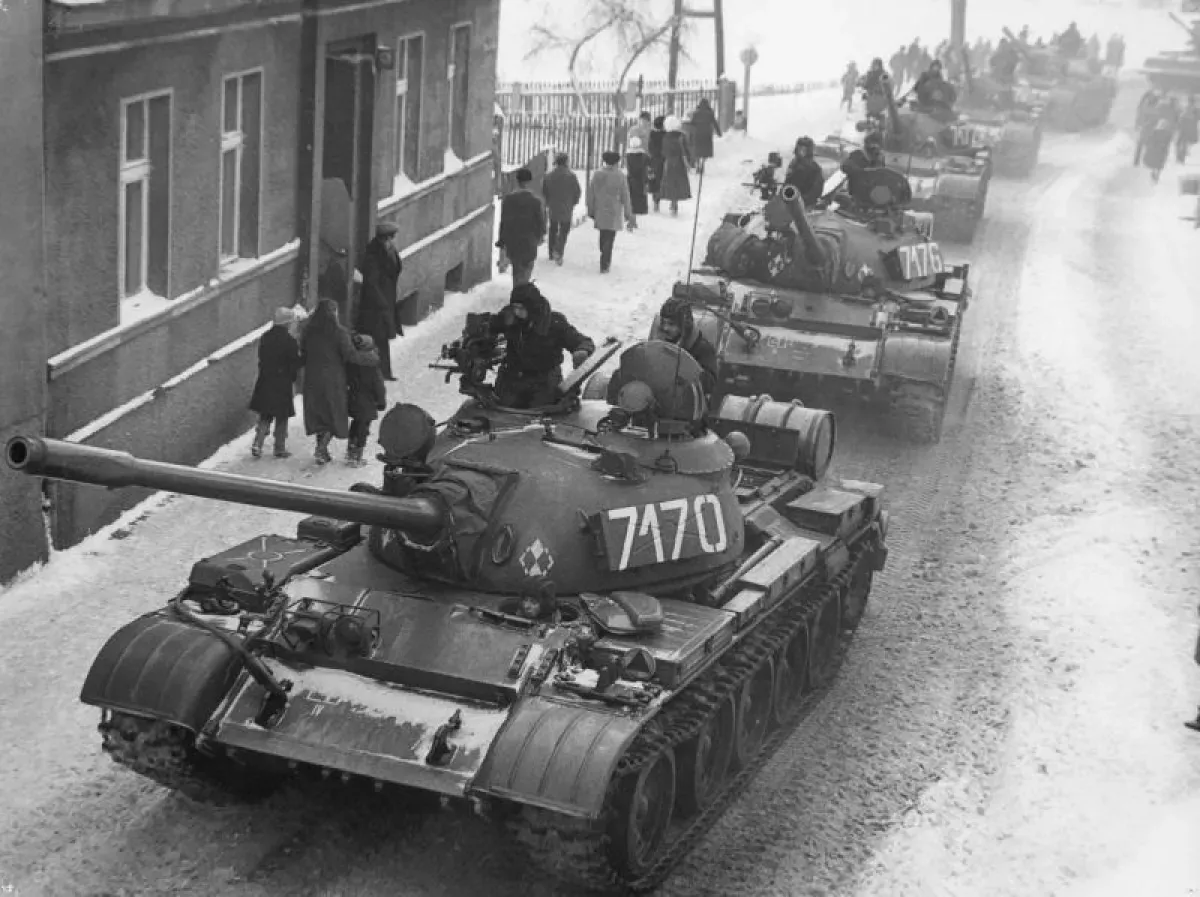Martial law is the imposition of military rule in place of civilian government, suspending normal legal processes and civil liberties. It is typically declared during times of war, emergencies like civil unrest or natural disasters, or after a military coup. The duration of martial law can be fixed or indefinite, with civil liberties potentially suspended throughout its enforcement.
1906: Martial Law Declared in San Francisco Following Earthquake
In 1906, martial law was enforced in San Francisco after a devastating earthquake struck the city.
1908: Draft Constitution in China Includes Martial Law Provisions
A 1908 draft constitution for the Beiyang government in China, inspired by Japan's Meiji Constitution, incorporated provisions for martial law.
March 1911: Provisional Constitution of the Republic of China Authorizes Martial Law
In March 1911, the Provisional Constitution of the Republic of China was promulgated, granting the President the authority to declare martial law during emergencies.
1912: Palace Revolt and Martial Law Act
Following the attempted Palace Revolt of 1912, King Vajiravudh of Thailand enacted the Martial Law Act, providing a legal basis for the imposition of military rule during times of crisis.
1914: Enactment of Thailand's Martial Law Act
The year 1914 marked a pivotal moment in Thailand's legal history with the enactment of the Martial Law Act, shaping the country's approach to internal security and the balance of power.
1915: Defense of India Act of 1915
During British rule in India, the Defense of India Act of 1915 effectively allowed for the implementation of martial law.
1916: Declaration of Martial Law During the Easter Rising
In 1916, during the Easter Rising, Lord Wimborne declared martial law in Dublin, which was later extended to the whole of Ireland.
1919: Martial Law in Punjab Following Amritsar Massacre
Martial law was declared in much of Punjab in 1919 in response to tensions arising from the Amritsar Massacre and the controversial Rowlatt Act.
1923: Establishment of the Republic of Turkey
The foundation of the Republic of Turkey in 1923 marked a pivotal moment in the country's history, establishing a new era of governance and national identity.
1934: Martial Law Imposed in San Francisco During Waterfront Strike
Martial law was declared in San Francisco in 1934 to address the turmoil resulting from the West Coast waterfront strike.
1939: Defense of India Act of 1939
The Defense of India Act of 1939, enacted during the British Raj, also provided a basis for martial law.
1942: Amendment to Thailand's Martial Law Act
The amendment to Thailand's Martial Law Act in 1942 reflects the evolving political landscape and the government's efforts to adapt legal frameworks to address changing circumstances.
1944: Further Amendment to Thailand's Martial Law Act
The 1944 amendment to Thailand's Martial Law Act signifies the ongoing adjustments to the country's legal framework in response to internal and external factors influencing governance and security.
October 1946: Martial Law Following Daegu Riot
In response to the Daegu Riot, the United States Army Military Government in Korea declared martial law in October 1946, highlighting the volatile political climate at the time.
1946: Supreme Court Rules on Martial Law in Hawaii
In 1946, the Supreme Court issued a ruling on the case of Duncan v. Kahanamoku, concerning the legality of martial law in Hawaii following the Pearl Harbor attack.
1947: Martial Law Declared in Taiwan Province
Following the February 28 incident, martial law was declared in Taiwan Province in 1947.
November 1948: Census and Deportations Under Military Administration
In November 1948, a census was taken in areas of Israel under military administration, and Arabs not registered were deported.
November 17, 1948: Martial Law During Jeju Uprising
President Syngman Rhee's regime in South Korea declared martial law on November 17, 1948, to quell the Jeju Uprising, a significant rebellion against the government.
1949: Nationalist Government Retreats to Taiwan, Martial Law Extended
After the Nationalist government's retreat to Taiwan in 1949, martial law continued for several decades.
1949: Implementation of Military Administrative Government
In 1949, military administrative government was put in place in Israel over areas with large Arab populations, imposing strict residency rules and restrictions on movement.
1949: Martial Law Imposed in Taiwan Amidst Civil War
Martial law was imposed in Taiwan in 1949 as the Chinese Civil War raged on, despite promises of democracy.
1949: Beginning of Taiwan's Martial Law Era
Taiwan entered a period of martial law in 1949 under the Kuomintang government, marking the beginning of a decades-long period of authoritarian rule and restrictions on civil liberties.
1955: Warsaw Pact Signing
Poland's signing of the Warsaw Pact in 1955 had implications for the country's sovereignty, as it allowed for potential intervention from other Eastern Bloc nations.
1956: Kafr Qasim Massacre
In 1956, the Kafr Qasim massacre occurred, where Israeli Border Police killed 48 Arab civilians returning home due to a curfew they were not notified about.
October 1958: Martial Law Declared in Pakistan
In October 1958, Martial Law was declared in Pakistan by President Iskander Mirza, leading to the appointment of General Muhammad Ayub Khan as Chief Martial Law Administrator.
1959: N/A
N/A
1959: Amendment to Thailand's Martial Law Act
Thailand's decision to amend the Martial Law Act again in 1959 underscores the dynamic nature of legal systems and their adaptation to the prevailing political and social climate.
April 19, 1960: Martial Law During April Revolution
The Rhee government in South Korea again imposed martial law on April 19, 1960, in an attempt to suppress the April Revolution, a student-led uprising against authoritarian rule.
1960: First Turkish Military Coup and Martial Law
The year 1960 witnessed the first instance of military intervention in Turkey's young republic, leading to the overthrow of the government and the imposition of martial law.
December 1962: Brunei Revolt and Imposition of Martial Law
Following the Brunei Revolt on December 8, 1962, martial law was imposed in Brunei with the help of British troops, and it remains in effect.
1962: New Constitution Adopted
Following the martial law declaration in 1958, a new constitution for Pakistan was adopted in 1962.
March 8, 1963: Start of Syria's Long-Standing Martial Law
Following the 1963 coup d'état, Syria entered a prolonged period of martial law, starting on March 8, 1963, granting the ruling Baath Party sweeping powers and curtailing civil liberties.
1966: Lifting of Military Rule for Arab Citizens in Israel
In 1966, military rule was lifted for Arab citizens living in predominantly Jewish cities within Israel, marking the end of an era of strict military control.
1967: State of Emergency Imposed in Egypt
A state of emergency was imposed in Egypt in 1967 and has remained largely in effect since then.
1967: Martial Law Following the Six-Day War
Following the 1967 war, martial law was imposed on the Palestinian population in the occupied territories, along with Jordanian, Syrian, and Egyptian populations in those areas.
1967: Beginning of Martial Law in Syria
Syria experienced a prolonged period of martial law, beginning in 1967.
1968: Implementation of Emergency Powers in Mauritius
In 1968, during a period of civil unrest, emergency measures were implemented in Mauritius, granting police extensive powers of arrest without requiring reasonable suspicion.
March 1969: Second Martial Law Imposed
Pakistan experienced its second martial law imposition in March 1969 under Yahya Khan, resulting in the abrogation of the 1962 Constitution and transfer of power to the army.
1970: Canada Invokes War Measures Act during the October Crisis
The Canadian government invoked the War Measures Act during the October Crisis in 1970, granting it emergency powers.
December 1971: First Civilian Martial Law
In December 1971, Zulfikar Ali Bhutto became the first civilian martial law administrator in Pakistan's history, assuming the roles of both president and martial law administrator.
1971: Bhutto Takes Over as Civilian Martial Law Administrator
After the secession of East Pakistan, Zulfikar Ali Bhutto came to power in 1971 and implemented martial law selectively in regions opposing his rule.
1971: Turkish Military Memorandum and Brief Martial Law
In 1971, the Turkish military issued a memorandum intervening in politics and briefly imposing martial law, aiming to address political violence and instability, but with limited success.
September 1972: Martial Law Under Ferdinand Marcos
President Ferdinand Marcos declared martial law in the Philippines in September 1972, citing the need to address growing civil unrest and the threat of a communist takeover.
1972: Amendment to Thailand's Martial Law Act
The 1972 amendment to Thailand's Martial Law Act demonstrates the ongoing efforts to refine and adjust legal instruments concerning security and governance in response to changing times.
1973: Constitution of Pakistan
The Constitution of Pakistan, adopted in 1973, was suspended during the state of emergency declared in 2007.
July 5, 1977: Third Martial Law Imposed
Pakistan's third martial law was enforced on July 5, 1977, by General Zia-ul-Haq after overthrowing Zulfikar Ali Bhutto in a coup.
July 1977: General Zia Imposes Martial Law
Following a period of instability and civil disorder, General Zia seized power in July 1977 and imposed martial law throughout Pakistan.
September 7, 1978: Appointment of Military Governor in Tehran
On September 7, 1978, in response to public demonstrations, Shah Mohammad Reza Pahlavi appointed General Gholam Ali Oveisi as the military governor of Tehran.
1978: Escalation of Violence and Martial Law in Turkey
As political polarization and violence escalated in Turkey, martial law was imposed in 1978, marking a period of heightened security measures and restrictions on civil liberties.
January 4, 1979: Appointment of Shapour Bakhtiar as Prime Minister
On January 4, 1979, as the Shah prepared to leave the country, he dissolved the military government and appointed Shapour Bakhtiar, a reformist critic of his rule, as the new prime minister.
1980: Military Coup and Prolonged Martial Law in Turkey
A military coup in 1980 led to the imposition of martial law in Turkey, which remained in effect for several years, significantly impacting the country's political and social fabric.
December 13, 1981: Introduction of Martial Law in Poland
On December 13, 1981, General Wojciech Jaruzelski imposed martial law in Poland to suppress the rising influence of the Solidarity Movement, leading to mass arrests and social control measures.
1981: State of Emergency Declared in Egypt
Following the assassination of President Anwar el-Sadat, Egypt declared a state of emergency in 1981.
1981: Martial Law in Poland
Martial law was imposed in Poland in 1981 to suppress political opposition.
1981: End of Martial Law Under Marcos
The Philippines' period of martial law under President Ferdinand Marcos, which began in 1972, came to an end in 1981.
July 22, 1983: Lifting of Martial Law in Poland
After over a year and a half, martial law in Poland was lifted on July 22, 1983, marking a significant turning point in the country's political landscape.
1983: Assassination of Benigno Aquino Jr.
The assassination of opposition Senator Benigno Aquino Jr. in 1983 while he was imprisoned fueled dissent and opposition against the Marcos regime.
1983: Lifting of Martial Law in Turkey
The year 1983 marked a turning point in Turkey as martial law, in place since the 1980 coup, was lifted, initiating a gradual return to civilian rule and democratic processes.
1986: People Power Revolution
The People Power Revolution of 1986, driven by economic hardship, human rights abuses, and electoral fraud, led to the ousting of Ferdinand Marcos from power.
1987: End of Martial Law in Taiwan
After 38 years, martial law in Taiwan was lifted in 1987, paving the way for democratic reforms and a transition to a more open society.
1988: Civilian Rule Returns to Pakistan
Pakistan transitioned back to civilian governance in 1988 following the death of General Zia in a plane crash.
1989: Death of Ferdinand Marcos
Ferdinand Marcos, ousted from power in 1986, died in exile in Hawaii in 1989.
1989: Tiananmen Square Protests and Martial Law in China
Following the Tiananmen Square protests in 1989, the Chinese government imposed martial law to quell dissent.
1989: Martial Law Imposed in Beijing After Tiananmen Square Protests
Following the Tiananmen Square protests of 1989, the Chinese government declared martial law in Beijing.
1991: Croatia and Bosnia and Herzegovina Declare Martial Law During Yugoslav Wars
Following their secession during the Yugoslav Wars in 1991, Croatia and Bosnia and Herzegovina declared martial law.
1991: Finland's Previous Emergency Preparedness Act
Prior to the 2011 Preparedness Act, Finland had a similar act in place (1080/1991) to handle emergencies.
1993: Oslo I Accords and Limited Palestinian Self-Rule
In 1993, the Oslo I agreements paved the way for limited self-rule for Palestinians under the Palestinian National Authority, despite parts of the West Bank remaining under martial law.
1995: Swiss Army Law
The Swiss Army Law of 1995 established the framework for the military's role in domestic situations, allowing for its deployment in cases of emergencies or to maintain order with parliamentary authorization.
June 1999: Martial Law in Yugoslavia Ends
Martial law in Yugoslavia, which had been declared in March 1999 following NATO airstrikes, was lifted in June 1999 after the signing of the Kumanovo Treaty.
October 12, 1999: Fourth Martial Law Imposed
Pakistan's government, led by Prime Minister Nawaz Sharif, was dissolved on October 12, 1999, marking the country's fourth experience with martial law.
October 1999: State of Emergency Declared
Instead of imposing martial law, General Pervez Musharraf declared a state of emergency in October 1999, leading to the suspension of the constitution, parliament, and provincial assemblies.
January 2002: Martial Law Legislation in Russia
In January 2002, Russia established a legal framework for the implementation of martial law, outlining the circumstances and procedures for its enactment.
October 2002: Elections Held Under Musharraf
General Pervez Musharraf, who assumed control in 1999, oversaw elections in October 2002 that resulted in Mir Zafarullah Khan Jamali becoming Prime Minister.
November 2002: End of State of Emergency in Turkey
November 2002 marked a significant step towards normalcy and democratic consolidation in Turkey as a long-standing state of emergency, implemented in response to political violence and instability, was lifted.
May 18, 2003: Martial Law Imposed in Aceh, Indonesia
On May 18, 2003, the Indonesian Army Chief, under the president's order, imposed martial law in Aceh for six months to combat separatists.
2003: Renewal of Emergency Laws in Egypt
Egypt renewed its emergency laws in 2003, continuing the state of emergency.
January 2004: Martial Law in Southern Thailand
In January 2004, martial law was imposed in specific provinces in southern Thailand to address the escalating insurgency and violence in the region.
2004: Dubious Presidential Election Results
The 2004 presidential elections in the Philippines were marred by allegations of irregularities, contributing to civilian dissatisfaction and criticism of President Gloria Macapagal Arroyo's legitimacy.
July 28, 2005: UN Response to Syria's State of Emergency
On July 28, 2005, the United Nations challenged the validity of Syria's extended state of emergency, criticizing its impact on human rights and calling for its termination.
May 2006: Extension of State of Emergency in Egypt
Egypt extended its state of emergency in May 2006, despite plans to replace it with anti-terrorism laws.
September 19, 2006: Military Coup and Martial Law in Thailand
Thailand experienced a military coup on September 19, 2006, leading to the declaration of martial law, the ousting of Prime Minister Thaksin Shinawatra, and a period of political instability.
2006: State of National Emergency Declared
In 2006, President Gloria Macapagal Arroyo declared a state of national emergency in response to a coup attempt and growing protests, rather than imposing martial law.
2006: Coup d'état in Thailand
In 2006, a coup d'état took place in Thailand, leading to the imposition of martial law.
November 3, 2007: State of Emergency Declared by Musharraf
President General Musharraf announced a state of emergency in Pakistan on November 3, 2007, suspending the 1973 constitution and dismissing Supreme Court Chief Justices.
November 12, 2007: Amendments to Military Act Grant Additional Powers
On November 12, 2007, Musharraf introduced amendments to the Military Act, expanding the powers and authority of the armed forces.
May 2008: State of Emergency Extended in Egypt
The state of emergency in Egypt was further extended in May 2008.
December 2009: Martial Law in Maguindanao
President Gloria Macapagal Arroyo declared martial law in the Province of Maguindanao in December 2009 following the Maguindanao massacre, a horrific incident of political violence.
May 2010: State of Emergency Extended Again in Egypt
In May 2010, Egypt once again extended its state of emergency.
June 2010: State of Emergency Continues in Egypt
Egypt's state of emergency continued to be in effect in June 2010.
February 2011: Transfer of Power and Martial Law in Egypt
In February 2011, amidst protests, Egyptian President Hosni Mubarak promised to remove the constitutional basis for the State of Emergency, but after his resignation, Vice President Omar Suleiman effectively imposed martial law by transferring power to the military.
2011: End of Syria's Martial Law
After nearly five decades, Syria's state of emergency and martial law were lifted in 2011 in response to widespread protests and international pressure, marking a significant moment in Syrian history.
2011: Finland Enacts Preparedness Act
Finland enacted the Preparedness Act (SDK 1552/2011) in 2011 to grant authorities necessary powers during emergencies.
2011: End of Martial Law in Syria
Martial law in Syria, which had been in effect for several decades, came to an end in 2011.
2013: Coup d'état in Egypt
A coup d'état occurred in Egypt in 2013, leading to the declaration of martial law.
May 20, 2014: Nationwide Martial Law in Thailand
Amidst political turmoil and unrest, Thailand's army chief declared nationwide martial law on May 20, 2014, granting the military significant authority and raising concerns about democratic processes.
2014: Coup d'état in Thailand
Thailand experienced another coup d'état in 2014, resulting in the implementation of martial law.
2015: Ukraine's Law on Martial Law
In 2015, Ukraine enacted a law defining the legal framework for the implementation of martial law, outlining the president's authority to declare it with parliamentary approval.
May 9, 2016: Allegations of Corruption Resurface
Allegations of corruption and ill-gotten wealth during the Marcos regime resurfaced during the 2016 Philippine presidential elections, particularly in relation to Imelda Marcos.
July 15, 2016: 2016 Turkish Coup D'état Attempt
On July 15, 2016, Turkey faced a significant challenge to its democratic institutions when a faction within the military attempted a coup d'état, employing the rhetoric of martial law.
May 2017: Martial Law in Mindanao
President Rodrigo Duterte declared martial law across Mindanao, the southern island of the Philippines, in May 2017 in response to the Maute group's attack in Marawi City.
December 2019: End of Martial Law in Mindanao
The period of martial law in Mindanao, declared in 2017, concluded in December 2019.
2020: Martial Law during the 2020 Nagorno-Karabakh War
Armenian Prime Minister Nikol Pashinyan declared martial law in 2020 during the Nagorno-Karabakh war.
February 1, 2021: Military Coup in Myanmar
On February 1, 2021, Myanmar's military, the Tatmadaw, overthrew the democratically elected National League for Democracy, establishing a military junta.
February 2021: Military Tribunals and Sentencing Under Martial Law
Since the February 2021 coup and subsequent martial law declarations, military tribunals in Myanmar have sentenced over 100 people to death.
March 14, 2021: Declaration of Martial Law in Yangon
On March 14, 2021, following the killing of protestors by security forces, the military junta declared martial law over the Yangon region, encompassing industrial zones.
February 2022: Ukraine Declares Martial Law After Russian Invasion
In February 2022, President Volodymyr Zelensky declared martial law in Ukraine as a result of the Russian invasion that began on the same day.
March 15, 2022: Parliament of Ukraine Passes Law on Labor Relations Under Martial Law
On March 15, 2022, the Parliament of Ukraine passed a law to modify labor relations regulations within the context of martial law, which had been declared in February 2022.
March 24, 2022: Ukraine's Law on Labor Relations Under Martial Law Takes Effect
On March 24, 2022, Ukraine's new law regarding labor relations under martial law came into effect, outlining adjustments to employment rules during the period of martial law.
February 22, 2023: Expansion of Martial Law in Myanmar
As of February 22, 2023, Myanmar's military junta had declared martial law in 50 townships across various regions, including Chin, Kachin, Karen, Karenni, Mon States, Yangon, and Mandalay.
October 2023: Ukraine Postpones Legislative Elections Due to Martial Law
Due to the ongoing martial law in Ukraine, the legislative elections planned for October 2023 were postponed, as elections cannot be held during periods of martial law.
November 2023: Ukraine's Martial Law Extended for the Tenth Time
As of November 2023, Ukraine's declaration of martial law had been extended ten times since its initial implementation.
2023: Australia Remains Free from Martial Law
As of 2023, Australia has not experienced the declaration of martial law since its formation as a nation.
Mentioned in this timeline
Ukraine is a country in Eastern Europe the second-largest on...
India officially the Republic of India is a South Asian...
Myanmar also known as Burma is a Southeast Asian country...

San Francisco is a major commercial financial and cultural hub...

The Chinese Civil War was a conflict between the Kuomintang...
China officially the People's Republic of China is an East...
Trending
23 minutes ago Curaçao Tourism Booming: New Resort and Arrival Surge Expected in 2026

24 minutes ago Laura Zapata joins 'La Casa de los Famosos 6' with a scout mentality.

24 minutes ago Yaxel Lendeborg's Viral Video: Michigan Coach Dusty May Responds to Purdue Trash Talk

1 hour ago Rosie O'Donnell Returns to US After Trump Threats, Ends 'TDS' Exile

2 hours ago Victoria Jones, daughter of Tommy Lee Jones, cause of death revealed.

2 hours ago Amber Glenn's Olympic short program: a blend of pressure and glory.
Popular

Jesse Jackson is an American civil rights activist politician and...
Randall Adam Fine is an American politician a Republican who...

Pam Bondi is an American attorney lobbyist and politician currently...

Barack Obama the th U S President - was the...

Kid Rock born Robert James Ritchie is an American musician...
The Winter Olympic Games a major international multi-sport event held...
